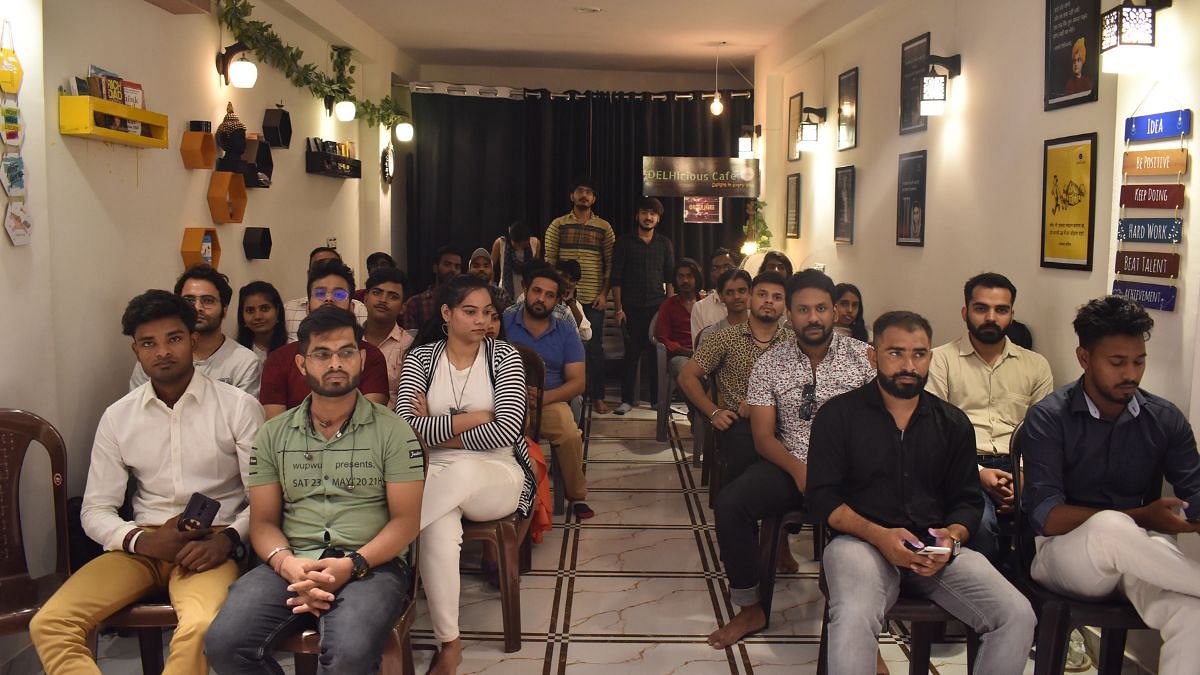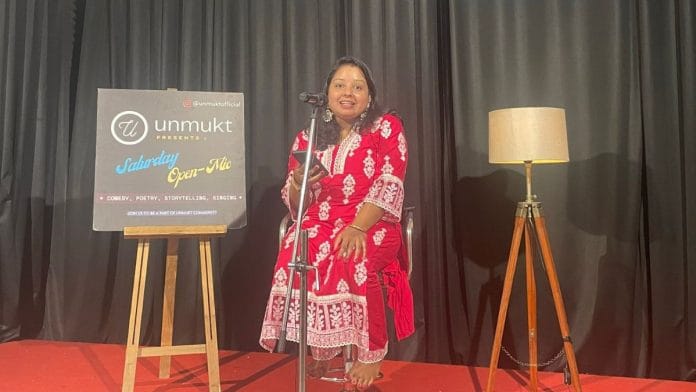The room’s ambience is warm and inviting. At the front is a small stage where a 35-year-old woman sits raging in her poetic expression. She has all the attention of the room that is filled with a young crowd.
Rashmi Tiwari’s poem is based on an incident in Madhya Pradesh, where a woman died by suicide before killing her three daughters, aged 5, 3, and 18 months due to alleged harassment by her husband’s family over not having a son.
“…phir us bachchi ki udaan dekhna, jise marne aur uske sath marne chali thi tum, yeh soch kar ki voh kamtar hai, uski tarakki dekh kar zamana sochega ki voh hazaro ladko se behtar hai” — you’ll see the success of the girl, the one you were going to kill because you thought she was less than a boy. But after watching her success, society will say she is better than a 1,000 sons.
Tiwari’s powerful words resonate with the audience, there is pin drop silence. Then, all of a sudden, a wave of applause erupts.
She has travelled from a far corner of Noida to reach Raj Nagar in Dwarka. And she wants to be heard. Tiwari is part of a wave of Gen Z enthusiasts giving a new life to English and Hindi poetry, not at some mushaira or a kavi sammelan but in basements and studios, equivalent to the size of a room. Where yellow lights brighten up the walls adorned with couplets by Ghalib and Akbarabadi. Open mics are popping up on Delhi’s cultural landscape — from Unmukt and The Digital Shayar in Raj Nagar, to Buddy on Stage in Malviya Nagar. Poetry that had disappeared from bookstores, glamorous lit fests and magazines, has now begun to rear its head on Instagram Reels.
Tiwari always had a passion for poetry but took to performing only this February. After completing her engineering degree, she took a break and became a full-time mother raising her seven-year-old son and 4-year-old daughter.
“Motherhood was enriching and fulfilling, but I lost a part of myself. Now, performing poetry feels like reconnecting with an old friend,” Tiwari said, adding that she’s a big advocate for open mics.
Open mics aren’t just spots for artists to strut their stuff; they’re gathering places for poets to share thoughts on love, society, personal struggles, broken hearts, childhood memories, and parental love. It’s a way for creators to find their tribe and tackle urban loneliness. And, at the centre of this revival, are college students, engineers, CAs, language specialists, corporate guys, and mothers, who wear their hearts on their sleeves.
According to Tiwari, open mic platforms such as Unmukt, The Digital Shayar, The Hunar March, Unheard Diaries and Buddy on Stage significantly boost artists, instilling confidence in their craft. “When I first stepped onto the stage, it felt like home. The response was fulfilling,” she said, praising the young hosts committed to creating opportunities for up-and-coming talent.
“They even invest their own money, knowing that the studio’s success isn’t guaranteed by its business ventures alone,” she added.

Also read: Mathura culture, Mahabharata Period — ASI digs Govardhan Hill after 50 years
Dreams come true
Unmukt — of a free space — is the brainchild of Satyam Raj, a Korean language specialist at a finance company in Bombay. But Raj prefers to be known as a poet. His passion for the art began during his language course at JNU in 2018. He then explored Delhi’s cafe scene, performing at open mic events despite his tight budget. The pandemic halted his streak of small gigs, but it also led him to observe the surge of poetry online. Much of it was problematic, with content that was “racist, vulgar, or plagiarised.”
Unmukt started off as a response to ensure “crass poetry” doesn’t swamp the internet. “Regulation on poetry is essential. Many poetry societies are passing off anything as poetry, only aiming to make money. Unmukt’s idea is to provide a platform for emerging artists to bring change,” said Raj.
The project was launched in July 2021 at a dance studio in Dwarka even as Raj freelanced as a Korean-English translator. “I saved up to rent a space and buy essential equipment such as lights, acoustic foams, a stage, and a microphone,” he said. He wanted to bring positive change to Delhi’s poetry scene by filtering out offensive content and preserving the quality and integrity of the shared work within the community. His aim isn’t to make money but to spotlight hidden talent.
Forty kilometres from Raj Nagar in Dwarka, another poetic movement is gaining visibility, in a basement tucked away in Malviya Nagar. With a performance fee of just Rs 100, Buddy on Stage by Gaurav Taneja intends to create more opportunities for young poets. Taneja sees a “noticeable rise in poetry enthusiasts in Delhi.”
“By establishing inclusive and accessible spaces that welcome diverse voices, the poetry scene can become a richer tapestry of perspectives and experiences,” he said.
According to him, encouraging collaboration and cross-pollination of ideas can lead to innovative and exciting new forms of expression. Developing workshops, mentorship programmes, and resources for skill development will help nurture emerging talent. Ankit Guriyan, a 29-year-old digital marketer, shares Taneja’s vision.

Also read: Punjab is undergoing an indie film revolution. Challenging the Jatt Sikh domination in cinema
Poetry and the price
Guriyan, who once struggled to find performance opportunities due to financial limitations, started The Digital Shayar in 2021 to empower artists with a passion for poetry. He often allows artists to perform for free if they can’t afford the fee.
“I review their work first, and if I see potential, I support them,” he said.
Purnima Modi, originally from Jharkhand and now living in Delhi, is a UPSC aspirant who moonlights as a thought-provoking poet. “As students, our biggest obstacle is managing our finances. Shelling out Rs 300 every week to perform poetry was out of the question,” she remarked. When Guriyan stumbled upon her work, he was determined to remove any financial barriers and allowed her to perform at open mic events free of charge.
Aman Sharma Kaushik, a 25-year-old LLB student from Campus Law Centre, has a similar story. “Only a fellow artist can truly appreciate the joy of someone believing in your talent and providing a free platform to express it,” he said.
Guriyan, known for extensively writing about love, is well-acquainted with poetry scenes in Mumbai and Delhi. In his view, Mumbai is all about the spotlight, while Delhi-NCR is a melting pot of creativity. Not just local people but aspiring poets from Uttar Pradesh and Haryana also flock to Delhi to showcase their talent. “There’s a blend of diversity and acceptance that Mumbai doesn’t quite match,” he added.
Also read: Masala, morality, real estate—Bengaluru dosa walk turns into overload of history & heritage
The viral poetry
Social media, like Instagram, has been a game-changer for poetry lately. It is like a free stage where even couch potatoes or broke artists can shine without breaking the bank. Poets share their thoughts in different flavours, from snazzy 10-second clips featuring everyday scenes with cool voice overs, to simple text posts. Internet also caters to those who feel shy before a camera.
Forget about those never-ending poems of yore, now it’s all about snappy lines and quick, catchy verses. The ones that click are the ones you can read, understand, and like in the time it takes to flick your thumb on Instagram.
Neha Roda, who ditched her 12-year-long CA profession for poetry, knows the drill. Her short videos are a hit, but it was the one-minute clip of her poem ‘Gum Kaisa’ that went viral, hitting 1.9 million views.
“Instagram is unpredictable but one has to keep experimenting. Usually, the short videos do wonders,” she said. People not only felt the vibe but also displayed their creativity by adding their own two-line verses in the comments of the Gum Kaisa video.
Roda’s reels receive hundreds of comments that prove the kind of connection she has with the audiences who seem mostly encouraging of her work.
“This is so beautiful and meaningful. Kudos to you”; “Beautifully penned. So realistic”; “Jo kar sakti hu, voh toh kar hi rahi hu… ab jo kar hi nhi sakti, voh na kar pane ka gham kaisa? (I’m doing what I can do, but what about those who can’t do anything? How sad must it be not to be able to do what you want).”
Forget about those never-ending poems of yore, now it’s all about snappy lines and quick, catchy verses. The ones that click are the ones you can read, understand, and like in the time it takes to flick your thumb on Instagram.
Many amateur poets have carved a niche for themselves by sticking to a template or a style on Instagram. For example, Prabhnoor, an actor, showcases the beauty and depth of English phrases in Hindi and Urdu while sitting in his car. His online fame gets him a packed house for his gigs at various poetry studios in Delhi.
But exposing one’s inner desires and thoughts before millions of unknown people also brings unfiltered criticism — and some of them can be demotivating to the point where one starts to second guess.
“It’s all criticism and no help,” said Bharat Sharma, founder, The Hunar Manch, another poetry society. The 31-year-old engineer has a friend who stopped writing.
“A friend of mine, inspired by my work, began crafting short Hindi rhymes and sharing them on Instagram. At first, he shrugged off the rude comments, but eventually, they took a toll on his mental health. One day, he threw in the towel and hasn’t scribbled a word since,” Sharma shared.
Many comments on his poetry were abusive, targeting his masculinity and ridiculing his display of vulnerability.
Contrary to social media, open mic studios hidden in the narrow lanes of Delhi offer a safe space to artists.
“Can poetry reach a stage where people can pursue it as a full-time profession and not just a side hustle? Well, it may take time but we are working towards it,” Sharma added.
(Edited by Anurag Chaubey)






